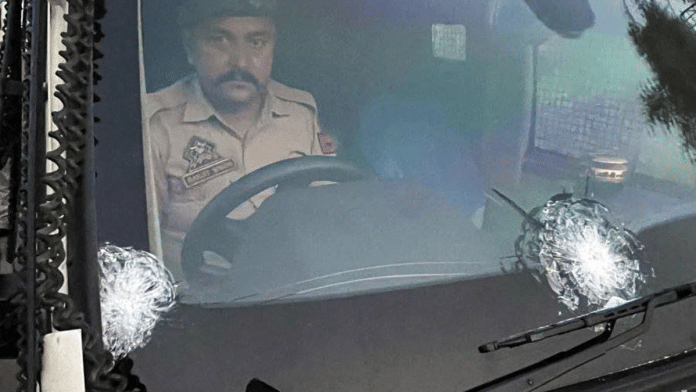New Delhi: Revival of old infiltration routes, thinned deployment of forces in the region, highly trained terrorists, and a dried up human and technical intelligence network are being attributed for the shift of terror incidents from Kashmir to Jammu in the last three years, making the region extremely vulnerable, ThePrint has learnt.
In less than 72 hours, three terror attacks were reported from Jammu region. While in Reasi Sunday, a pilgrim bus was attacked in which 9 people, including women and children, were killed and 42 injured, the terrorist attack in Kathua’s Saida Sukhal village Tuesday evening led to the death of a CRPF jawan. Soon after, seven security personnel were injured in an attack at the Army’s Temporary Operating Base in Doda.
Then on Wednesday night, unidentified terrorists fired at personnel of Special Operations Group in Kishtwar. One SOG jawan got injured in the exchange of gunfire.
According to a source in the security establishment, the Samba Kathua route of infiltration has seen a revival. Terrorists after infiltrating from Kathua usually moved to the Kashmir Valley by road via trucks, which is not happening, the source explained. In addition to that, the highly trained terrorists, who infiltrated from across the Line of Control before crossing over to the Pir Panjal range to Shopian in South Kashmir, are staying back, the source said.
These infiltrations, the source said, are happening in small batches and going unnoticed, exacerbating the situation.
“There is a change in strategy. Now they are being seen at places they were otherwise not seen. Areas like Doda, Udampur, Reasi are new fronts for their operation. By carrying out these sporadic attacks, they are hitting the areas where deployment of forces is thin with an aim to weaken the security grid,” the source said.
A second source in the security establishment explained that the recent spate of attacks in Jammu is a “tactical and strategic shift” by the terror groups to safeguard their assets in Kashmir.
“The crackdown on overground workers in Kashmir made them (terror groups) move to Jammu to safeguard their assets. This is being done to give some breathing space to the ecosystem in Kashmir,” the source said. “Terrorists are being sent in small groups and have activated all older routes for infiltration into Jammu. They are now staying put in the region.”
While 30 to 40 foreign terrorists are active in the Kashmir valley, a little more are active in the Jammu region, according to intelligence inputs. Eight to 12 of them are active in Poonch, 8 to 10 in Rajouri, 14 to 16 in Doda and Udhampur, and 4 to 6 in Kathua.
“This is a big number of foreign terrorists that poses a big challenge to internal security. Before monsoon, more infiltration is expected,” the source said.
Among the previous terror incidents reported from Jammu are the June 2021 incident when an Improvised Explosive Device (IED), was dropped from what is believed to be a commercially available small drone on the Air Force Station in Jammu.
On 20 April 2023, five soldiers were killed in Poonch district when their vehicle was fired upon by unidentified terrorists. Then in May 2023, another five Army personnel were killed in an explosion triggered by terrorists, who were cornered by security forces.
‘Thin deployment of forces, dried up intelligence’
The second source explained that in 2020 as the standoff with China along the Line of Actual Control in Ladakh started, several companies of the Army were moved to that sector, leaving key areas in Jammu without much deployment. This, the source said, has worked for the advantage of the terror organisations.
“This has given them confidence to move around, relocate from Kashmir and regroup in Jammu. This is why terror activities revived in areas like Rajouri, Poonch, Reasi, Kathua. These groups in small batches prefer to sit in Jammu where the forces are much lower in number and then travel to South Kashmir or other areas.”
The source also said that a “dried up intelligence network, both human as well as technical” is also a big challenge for forces operating in the Jammu region.
The terrorists, the second source said, are extremely “technically sound” and use applications like Telegram on phones of villagers they take shelter in, because of which they are difficult to trace.
“There is a serious hit on human as well as technical intelligence. Pakistanis are not using Indian mobile numbers. They are also not using wireless satellite phones that we can intercept, so the technical inputs are not coming. They often use phones of locals and communicate with their handlers in Pakistan via apps like Signal and Telegram.”
Moreover, the officers in the Jammu region have not cultivated a good network of informers that would give them intelligence inputs about movement of these groups, the source said.
“This is a big failure as it is crucial for any agency to develop human intelligence. It appears that they ignored Jammu thinking it cannot be prone to these attacks. There is a complete lack of effort, miscoordination, infighting in the police force that has led to the issue,” the source said.
(Edited by Tony Rai)
Also Read: Lashkar-e-Taiba offshoot TRF says it was behind Reasi bus attack, warns of more attacks on tourists






